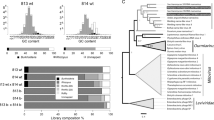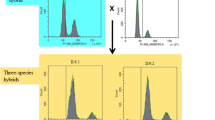Abstract
FOR many years it was believed that plasmodia of the same species of Myxomycetes merge on contact, whereas those of different species do not. This test was proposed as a criterion of specificity by Torrend1 in 1909. In 1934 Skupienski2 announced the discovery of physiological races in Didymium iridis (D. xanthopus) and stated that the plasmodia of the two races he had in culture would not merge. Later he found3 physiological races in Didymium squamulosum, and Gray found them in Physarum polycephalum4.
This is a preview of subscription content, access via your institution
Access options
Subscribe to this journal
Receive 51 print issues and online access
$199.00 per year
only $3.90 per issue
Buy this article
- Purchase on Springer Link
- Instant access to full article PDF
Prices may be subject to local taxes which are calculated during checkout
Similar content being viewed by others
References
Torrend, C., Broteria, 6, 5 (1909).
Skupienski, F. X., Ann. Protistol., 4, 121 (1934).
Skupienski, F. X., C.R. Soc. Biol., 131, 355 (1939).
Gray, W. D., Amer. J. Bot., 32, 157 (1945).
Collins, O. R., Amer. J. Bot., 48 (in the press).
Author information
Authors and Affiliations
Rights and permissions
About this article
Cite this article
ALEXOPOULOS, C., ZABKA, G. Production of Hybrids between Physiological Races of the True Slime Mould Didymium iridis. Nature 193, 598–599 (1962). https://doi.org/10.1038/193598b0
Issue Date:
DOI: https://doi.org/10.1038/193598b0
This article is cited by
-
Myxomycete biosystematics: Some recent developments and future research opportunities
The Botanical Review (1979)
-
Genetic control of somatic cell fusion in a myxomycete
Heredity (1974)
-
Developmental stages in the laboratory culture of the homothallic myxomycete Didymium squamulosum
Mycopathologia et Mycologia Applicata (1965)
-
The Myxomycetes II
The Botanical Review (1963)
Comments
By submitting a comment you agree to abide by our Terms and Community Guidelines. If you find something abusive or that does not comply with our terms or guidelines please flag it as inappropriate.



